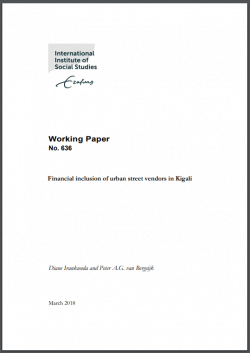
Policy highlights:
- Street vending offers opportunities for people with low levels of education and limited capital to invest in small business ventures. However, street vendors are often not financially included. In Africa, there are enormous differences in the proportion of the population who hold a bank account, ranging from 11% in central Africa to 51% in southern Africa. In Rwanda, the government has set a goal to accomplish 90% financial inclusion by 2020.
- This study found that: 1) understanding the determinants of financial inclusion is crucial (e.g. if being a woman significantly reduces the probability of having an account, then a gender-specific policy may be necessary); 2) ownership of a bank account is influenced by a vendor’s activity (e.g. 91% for vendors selling clothes compared to 36% for vendors selling food and drinks); 3) geography is an important driver of financial inclusion (i.e. proximity to financial institutions); and 4) the age and education of the respondents did not influence the findings.
- Policymakers should: 1) base their policies on a rigorous, thorough and detailed analysis of the determinants of financial inclusion and exclusion, and 2) consider the geography of financial inclusion, ensuring that financial institutions are available in the vicinity of targeted populations.










